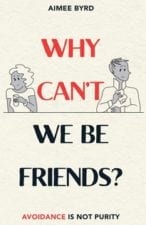My review of Aimee Byrd’s third chapter of Why Can’t We be Friends? is going to be brief. It is going to be brief for the excellent reason that this is supposed to be a critical review, and this particular chapter contains very little to criticize. It was, in sum, an outstanding chapter. Put another way, it was a premise that was worthy of a much better argument.
In this chapter, she outlines the “call and response” nature of God’s relationship to us, and how that played out in our first rebellion, and how it matters in the restoration of relationship that is offered to us in Christ. This chapter was scripturally faithful, and theological astute. It was really good.
“God has spoken to humankind” (Loc. 677). “God has revealed himself to us” (Loc. 678). Prior to repentance, when God calls our names, we cower—as Adam and Eve did in the bushes. But when God calls our names in Christ, there is no longer any need to cower. But in either case, whether we hide or whether we come as summoned, the liturgical interplay is there. The call and response is there.
Having established all this, she gives some small indications near the end of the chapter of the use she will make of this premise, and it is only a small trouble. But mischief will come of it later on.
“If we believe the excuses for why Christian men and women can’t be friends, we deny both our purpose (communion) and our agency to achieve it” (Loc. 800).
Well, certainly, if God intends for us to pursue such relationships, then it follows that in Christ He has made the provision for us to do so. But how do we know that we are supposed to do this? Is it really part of my created purpose to be friends with women not my wife? God does equip us to do what He has called us to do, but what we are debating is whether He has called us to special one-on-one friendships under the guise of the brother/sister relationships. One of the things Aimee Byrd appears to be doing is falling into a category mistake. Brothers and sisters can be friends, but they need not be. They are not the same thing; they are overlapping categories—not different names for the same category.
Another thing she has mentioned a few times is that “meeting all your relational needs” it is a heavy demand to place on a spouse. Yes, but my instinctive response is to wonder why having all my relational needs met is any kind of necessity? “Meeting emotional needs” and “avoiding stereotypes” are imperatives that I do not see being derived from the New Testament.
Marriage is creation ordinance, and it is the only lawful outlet for sexual expression. By various means, God summons us to marriage. This is a risky endeavor. Because it is a fallen world, we have to reckon with the reality of unhappy marriages. Nevertheless, we are still called to it. Eve was given to Adam as a paradigm for the rest of human history. A man will leave his father and mother and cleave to his wife, and the two will become one flesh.
But where is the imperative for cross-sexual friendships? Where are we told to do this? Just as marriage is risky, so also friendship across the male/female line is risky. But when we cross that particular line, we have no imperative, no promises, and we have no oaths to seal it, and we have all the same high levels of risk.
“Do we have the faculties to enjoy relationships between the sexes in purity?” (Loc. 801).
My question here is what does she mean by we? Before you become friends with someone, you don’t know them. Even supposing that you know that your own motives are friendship motives all the way down to the ground (and I would submit that this is not as easy as some might assume), you know next to nothing about the motives of the other person. How could you? You aren’t friends with them yet. You have no idea. When you enter into that friendship, and if at some point you begin to suspect that all is not healthy on the other side, you already have gotten yourself into a rat’s nest of a situation. You are already in a place where you ought not to be.
But—and I am just speaking to the blockhead guys here—this cannot be fixed with a simple “conversation”—as though saying and agreeing verbally that you are “just friends” makes it so. I have seen this play out before between unattached guys and girls who are “just friends.” He begins to suspect something is up, and since he is nowhere near ready to make a commitment, he decides he needs to have the talk with his “friend.” So he says, “We’re just friends, right?” What’s she supposed to say? “No, not friends at all. I desperately want to bear your children!” Certain levels of dishonesty are already baked into situations like this, and if one or both of the parties are married to other people, just imagine the possible mayhem.
“Do we express our love for one another by not being friends?” (Loc. 803).
Again, note the we. And I would suggest that the answer to this question is yes. Avoidance of friendship can be a true act of koinonia love—and frequently is.


